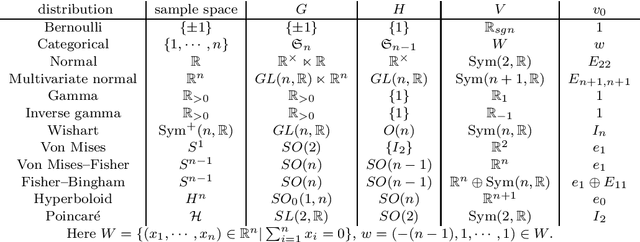Taro Yoshino
On a method to construct exponential families by representation theory
Jul 06, 2019
Abstract:Exponential family plays an important role in information geometry. In arXiv:1811.01394, we introduced a method to construct an exponential family $\mathcal{P}=\{p_\theta\}_{\theta\in\Theta}$ on a homogeneous space $G/H$ from a pair $(V,v_0)$. Here $V$ is a representation of $G$ and $v_0$ is an $H$-fixed vector in $V$. Then the following questions naturally arise: (Q1) when is the correspondence $\theta\mapsto p_\theta$ injective? (Q2) when do distinct pairs $(V,v_0)$ and $(V',v_0')$ generate the same family? In this paper, we answer these two questions (Theorems 1 and 2). Moreover, in Section 3, we consider the case $(G,H)=(\mathbb{R}_{>0}, \{1\})$ with a certain representation on $\mathbb{R}^2$. Then we see the family obtained by our method is essentially generalized inverse Gaussian distribution (GIG).
A method to construct exponential families by representation theory
Nov 04, 2018
Abstract:In this paper, we give a method to construct "good" exponential families systematically by representation theory. More precisely, we consider a homogeneous space $G/H$ as a sample space and construct a exponential family invariant under the transformation group $G$ by using a representation of $G$. The method generates widely used exponential families such as normal, gamma, Bernoulli, categorical, Wishart, von Mises and Fisher-Bingham distributions. Moreover, we obtain a new family of distributions on the upper half plane compatible with the Poincar\'e metric.
 Add to Chrome
Add to Chrome Add to Firefox
Add to Firefox Add to Edge
Add to Edge